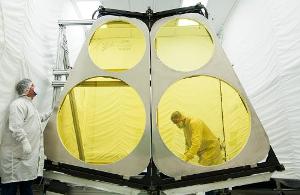May 21 2014
Ball Aerospace & Technologies Corp. has completed thermal vacuum environmental tests on critical components for the Defense Advanced Research Projects Agency (DARPA) Membrane Optic Imager Real-Time Exploitation (MOIRE) telescope. Two sections of the primary mirror composite back structure and the structure deployment hinges successfully underwent environmental tests to simulate the temperature range and vacuum of a space environment.
 Ball Aerospace completed thermal vacuum and environmental tests on critical components for the Defense Advanced Research Projects Agency (DARPA) Membrane Optic Imager Real-Time Exploitation (MOIRE) telescope
Ball Aerospace completed thermal vacuum and environmental tests on critical components for the Defense Advanced Research Projects Agency (DARPA) Membrane Optic Imager Real-Time Exploitation (MOIRE) telescope
"Results from the environmental tests are very promising for future application of the technology," said David Kaufman, vice president & general manager for Ball's National Defense strategic business unit. "By retiring risk and increasing TRL (technology readiness level) of key components we are one step closer to providing persistent imaging from space that many communities are eager to access."
Image quality from space is dependent on a stable platform. The composite back structure developed by ATK Space Components provides a lightweight option with the required stability needed for persistent imaging from geostationary orbit. Ball Aerospace designed and built the deployment hinges that would be used to unfold the telescope primary in space. Testing the hinges in a relevant environment helps retire risk and proves the required stability characteristics of the primary.
See MOIRE animation at www.youtube.com/watch?feature=player_embedded&v=q5oqle9Ct4Q
The DARPA MOIRE program is demonstrating the ability to decrease mass and costs of large imaging systems using lightweight diffractive membrane optics. Since the contract award in 2010, Ball Aerospace has been incrementally maturing the manufacturability required for large collection area telescopes (up to 20 meters). The subassemblies used in the most recent test are needed to hold the membrane optics tight and flat, and provide the necessary image quality of the system. Environmental testing of the components is the final phase of DARPA funding for the MOIRE program.
"As a company with a rich heritage in space optics, this is both an innovative program for Ball Aerospace and a paradigm shift," added Kaufman. "By using replicated optics techniques to deliver affordability there is no longer a lengthy manufacturing process of glass mirrors, but instead a process similar to a printing press."
Ball Aerospace & Technologies Corp. supports critical missions for national agencies such as the Department of Defense, NASA, NOAA and other U.S. government and commercial entities. The company develops and manufactures spacecraft, advanced instruments and sensors, components, data exploitation systems and RF solutions for strategic, tactical and scientific applications. For more information, visit http://www.ballaerospace.com/.
Ball Corporation (NYSE: BLL) supplies innovative, sustainable packaging solutions for beverage, food and household products customers, as well as aerospace and other technologies and services primarily for the U.S. government. Ball Corporation and its subsidiaries employ 14,500 people worldwide and reported 2013 sales of $8.5 billion. For more information, visit www.ball.com, or connect with us on Facebook or Twitter.